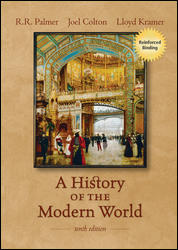
History of the Modern World, 10th Edition (Palmer)Chapter 19: Democracy, Anti-Imperialism, and the Economic Crisis After the First World WarChapter OverviewIn the years following the war, as countries struggled to repair their economies, democracy in the form of widening suffrage and social legislation spread in the western European countries and in North America. The new eastern states undertook programs of modernization, and peasant parties became the greatest force of democracy. Germany faced challenges from radicals and the increasing economic pressures brought by war damages and reparations. In Asia, anti-imperialist, nationalist movements gained momentum, while Japan shocked the world with its own imperialist ambitions. The prosperity of the 1920s was brought to a halt as an agricultural depression and the crash of the New York stock exchange triggered a worldwide depression. The international system of cooperation disintegrated in the face of increasing economic nationalism. |  |















